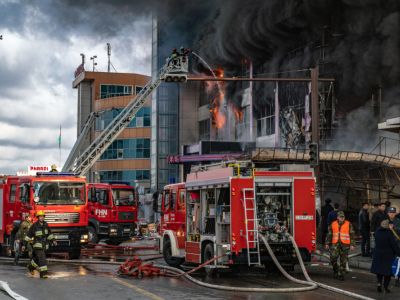A senior US official said Monday that Russia had not yet closed the door to the possibility of letting the United States use former Soviet military bases for launching an attack on Afghanistan.
US Undersecretary of State for Arms Control John Bolton met Russian Foreign Minister Igor Ivanov for 45 minutes for talks that had been due to focus on missile defense and nuclear disarmament issues.
However the meeting inevitably steered toward a joint response to last week's attacks on Washington and New York, as well as Moscow's willingness to help hunt down top suspect Osama bin Laden.
On Friday, Russian Defense Minister Sergei Ivanov firmly ruled out the use of any former Soviet bases for an attack -- either ground or air -- on Afghanistan's Taliban militia.
But Bolton, following his Monday meeting with Igor Ivanov, was optimistic that Moscow's view has since changed.
"I don't think they have ruled anything in or anything out," said Bolton.
Russia's most senior officials appeared to confirm Bolton's view.
President Vladimir Putin telephoned Turkmenistan President Saparmurad Niyazov and sent the head of Russia's Security Council, Vladimir Rushailo, to the Central Asian region to meet local leaders.
"Without doubt, it is impossible not to respond to acts of international terrorism," Rushailo said in televised remarks.
"But the measures repulsing the terrorists must be precise, and all the negative consequences must be taken into account," he added. "Obviously, civilians must not suffer when these actions are carried out."
Gryzlov added that Russia was "in touch with the United States, and is ready to provide all the necessary information through law-enforcement channels."
Moscow had previously signaled its assent to whatever action US President George W. Bush might seek to take over the suicide air attacks terror that left more than 5,000 people dead or missing. The toll included 117 Russians, according to the Russian embassy in Washington.
However Moscow has also displayed extreme reluctance to take on an active role in any campaign.
Kremlin officials had stressed that the former Soviet republics -- labeled as Russia's "neighborhood" by US Secretary of State Colin Powell last week -- would not be involved.
Yet some leaders from the former Soviet republics that border Afghanistan appeared to have a different view following telephone talks with Putin.
"We have not received any request from the US about providing military aid but we are ready to discuss all possible forms of cooperation in the fight against international terrorism," said Bakhodir Umarov, a spokesman for the Uzbek foreign ministry.
Others, including representatives from Tajikistan, a poor nation that fears an influx of Afghan refugees, appear to be keeping to a firmer line, saying any war in the region would be counter-productive.
"This can't happen, because Turkmenistan is a neutral country," a Turkmenistan foreign ministry official told AFP.
Also souring talks between Washington and Moscow is Russia's continued engagement with nations viewed as sponsors of terrorism by the United States -- Iraq, North Korea and Iran.
Russia has denied providing these states weapons of mass destruction or technological know-how. Yet Bolton stressed that the question was not being ignored in Washington.
"There is an overlap for states that are sponsors or harborers of terrorism and states that are seeking to acquire biological or nuclear weapons, and ballistic missile capabilities," said Bolton.
"So the issue of Russian involvement with weapons of proliferation is one that we find extremely important. We had discussed it at a prior meeting to this series and earlier meetings before that," he said.
"I am sure that as these political discussions continue, that will be a subject of further consultations of very high priority” -- MOSCOW (AFP)
© 2001 Al Bawaba (www.albawaba.com)









